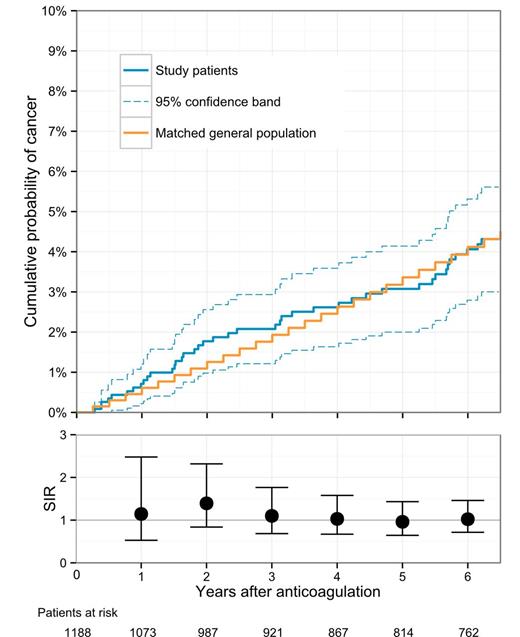Abstract
Background: A venous thromboembolic event (VTE) may indicate an underlying cancer. In population based studies the likelihood for developing cancer was substantially elevated during the first 12 months. Data on a persistently increased risk thereafter are conflicting and recommendations regarding screening are lacking. Two studies evaluated the effect of vitamin K antagonist (VKA) treatment on the long term risk of cancer, but the reported outcomes are discrepant.
Aim: To evaluate the long-term risk of cancer in a well defined cohort of patients with an unprovoked VTE.
Methods: In a large prospective cohort study, we followed patients with a first VTE after discontinuation of anticoagulation with VKA and excluded those with VTE secondary to surgery, trauma or pregnancy, major thrombophilia or with requirement of long-term antithrombotic therapy. Patients entered the study at the time of discontinuation of VKA. Study endpoint was occurrence of cancer. The ratio of the observed cases of cancer and the number of cases expected based on national cancer incidence rates was calculated and expressed as standardized incidence ratio (SIR). The role of recurrent VTE as risk factor was studied using a nested case-control approach. For each patient with recurrent VTE a control group of similar patients without recurrence (based on age and sex) was extracted from the study data. A Cox model was fitted on the modified data, accounting for multiple observations per patient and adjusting for duration of anticoagulation.
Results: 62 (5.2%) of 1188 patients were diagnosed with cancer (lung 10, hematologic 9, colon 8, breast 7, prostate 5, skin 4, brain 1, others 18) during a median follow up of 96 months (range 1-267). Patient with cancer were older (57 vs 48 years, p<0.001) but did not differ from the non-cancer population with regard to body mass index, blood cell counts, D-Dimer, factor VIII or C-reactive protein levels.
The probability of cancer was 0.7% (95% CI 0.1-1.3%), 1.8% (95% CI 1.0-2.6%) and 3.1% (95% CI 2.1-4.1%) after 1, 2 and 5 years, respectively. The corresponding SIR (95% CI) of 1.15 (0.53-2.5), 1.4 (0.84-2.32) and 0.96 (0.65-1.44) did not significantly differ from the expected rates in an age- and sex-matched general population (Fig. 1). Among cancer patients the number of patients with recurrent VTE was similar to those without recurrence [14/62 (23%) vs. 280/1126 (25%)]. In the nested case control study taking into account the time until cancer development, VTE recurrence was not associated with a higher risk of cancer [hazard ratio (HR) 1.17 (95% CI 0.66-2.07)]. We studied the duration of anticoagulation as a continuous variable on the risk of cancer in a Cox proportional hazard model. The HR of cancer was 0.86 (95% CI 0.76-0.98; p=0.02) for each one-month prolongation of anticoagulation after adjustment for age and location of first VTE.
Conclusions: In patients with a first unprovoked VTE the long-term incidence of cancer is comparable to that in the general population. VTE recurrence is not predictive for a future cancer diagnosis. The duration of anticoagulation may have an effect on the risk of cancer. Screening strategies after discontinuation of anticoagulation should not exceed those recommended for the general population.
Probability of cancer in patients with unprovoked VTE and the general population (upper panel) and corresponding standardized incidence ratios (SIR, lower panel); bars indicate 95% confidence intervals.
Probability of cancer in patients with unprovoked VTE and the general population (upper panel) and corresponding standardized incidence ratios (SIR, lower panel); bars indicate 95% confidence intervals.
No relevant conflicts of interest to declare.
Author notes
Asterisk with author names denotes non-ASH members.


This feature is available to Subscribers Only
Sign In or Create an Account Close Modal